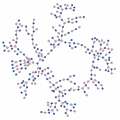Two concerns emerged in my discussions on Twitter regarding socialization that I want to address:
Socialization does not make someone's entire being.
Oversocialization is on the rise due to both our technologies AND our social structure and this spells unique problems for democracy
Part 1: Socialization and Subjectivity
When I discussed socialization, I explained it in a fairly narrow manner: I described the processes as being "one-way" and furthermore did not discuss the inner subjectivities and contingencies of the individuals experiencing the socialization.
...
Socialization hands you a packet of ‘Goods’ that the society recognizes and expects you to internalize as your own ‘Goods’. Failure to do so can lead to exclusion, punishment, etc.
I did mention in passing one element of an individual's subjectivity and how it may relate to socialization:
When we encounter a new group/network that we have a reasonable expectation of seeing in the future and that we care about, we will attempt to internalize the norms and values of the network in order to achieve high-status (be accepted and/or avoid discipline).
Note that last point: “and that we care about”. Socialization only works if we trust and respect the network/institution we are engaging with. If we think school is stupid, or the media is full of lies, or religion is just a magic sky man story, or that our family sucks, we are less likely to internalize their norms: HOWEVER, they will (likely) still be elements of our socialization.
We each have inborn natures and experiences that shape the development of those natures. Many of these experiences sit outside the socialization process and come from a massively diverse set of sources (the birds outside your window, the food you eat, the weather, etc.). We are defined by far more than our place in the grand machine of society: our internal subjectivity is integral to our being.
Mark Granovetter cites sociologist Dennis Wrong in a criticism of those who would see humans as either entirely or overwhelmingly shaped by the society around them:
Null hypotheses and their associated conceptions of human nature lead to unstated but consequential ideas about the nature of human action. When pushed too far, such conceptions distort. The sociological conception of actors as highly responsive to their social setting, for example, was famously criticized by sociologist Dennis Wrong as the "oversocialized conception of man in modern sociology" (1961) - a conception of people as so overwhelmingly sensitive to the opinions of others, and hence obedient to the dictates of consensually developed norms and values, internalized through socialization, that obedience is not burdensome but unthinking and automatic.
Wrong noted that..."My objection is that...though sociologists have criticized past efforts to single out one fundamental motive in human conduct, the desire to achieve a favorable self image by winning approval from others frequently occupies such a position in their own thinking."
(From SOCIETY AND ECONOMY by Mark Granovetter
Wrong quoted from his 1961 paper, THE OVERSOCIALIZED CONCEPTION OF MAN IN MODERN SOCIOLOGY, pages 188-189)
Subjectivity is the gateway to our moral autonomy. We are not all cogs in a machine nor are we entirely products of the world around us. We each maintain responsibility to understand the world. There is a growth process between when one is six years old and does not reach into the cookie jar for fear of a smack from one's mother, and when one does not reach into the cookie jar because one understands cookies are unhealthy and cannot be a meal.
The difference between an oversocialized individual and someone who is "merely-socialized" rests on whether or not a person automatically responds to the stimuli of a trusted authority and unthinkingly register them as True. Whether one immediately accepts the trusted authority and its topography of moral space, or one has at least some degree of questioning and investigation. It is this DEPTH that is profoundly lacking in the oversocialized. An oversocialized individual and a merely-socialized individual may hold the exact same positions, believe the same religion, etc. but the oversocialized individual lacks the depth that comes from exploring moral space and the World on one's own terms.
Part 2: The growing problem of oversocialization...and the further undermining of democracy
As I have mentioned before, oversocialization becomes a serious problem on a societal scale when there is a relatively small set of dominant institutions that end up oversocializing a huge number of people.
With every wave of technological innovation, there is a potential for the previously dominant institutions to be dislodged. In many cases, we see a period of "disorder" in which a myriad set of actors take advantage of the new technology to reshape the "landscape of socialization." The power of the previously dominant institutions declines and is sometimes silenced altogether.
Of course, the converse is also possible: the older institutions understand the new technology, regroup, and attempt to establish dominance in this new space. Sometimes they succeed. The 2010s was one such period. "Legacy Media" increasingly captured and centralized previously fractured corners of the internet either directly through acquisitions or indirectly through deals and rampant censorship by ideologically aligned platforms.
So, we have the older institutions intensifying their dominance. That is a problem itself, but it becomes amplified a hundred-fold when considering the totalizing nature of modern technology. The only way to escape modern technology is to sever yourself from society in such a way that you effectively become inconsequential to said society.
Of course, we now have to face the issue of democracy:
So now, we have a situation where dominant institutions not only give you information but also give you your values. And sometimes the institutions giving you each of these are the SAME institutions.
Democracy is little more than laundered oligarchy, and nowhere is that more apparent than in the manufacturing of consent that occurs today. Party elites switch positions and the party members rapidly follow. With such totalizing technology, democracy becomes ever more of a sham.


